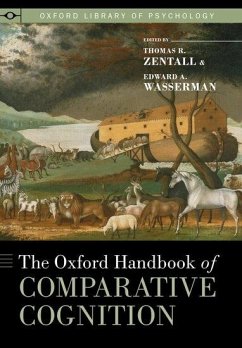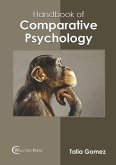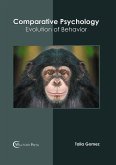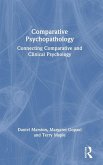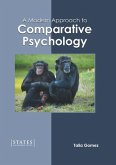Oxford Handbook of Comparative Cognition (Revised)
Herausgeber: Zentall, Thomas R; Wasserman, Edward A
Oxford Handbook of Comparative Cognition (Revised)
Herausgeber: Zentall, Thomas R; Wasserman, Edward A
- Gebundenes Buch
- Merkliste
- Auf die Merkliste
- Bewerten Bewerten
- Teilen
- Produkt teilen
- Produkterinnerung
- Produkterinnerung
This comprehensive volume illustrates why an understanding of animal intelligence is essential in disclosing the nature of minds other than our own making it a fascinating volume for anyone curious about the state of modern comparative cognition.
Andere Kunden interessierten sich auch für
![Handbook of Comparative Psychology Handbook of Comparative Psychology]() Handbook of Comparative Psychology143,99 €
Handbook of Comparative Psychology143,99 €![Getting Control (Revised Edition) Getting Control (Revised Edition)]() Lee BaerGetting Control (Revised Edition)23,99 €
Lee BaerGetting Control (Revised Edition)23,99 €![Comparative Psychology: Evolution of Behavior Comparative Psychology: Evolution of Behavior]() Comparative Psychology: Evolution of Behavior151,99 €
Comparative Psychology: Evolution of Behavior151,99 €![Comparative Psychopathology Comparative Psychopathology]() Daniel MarstonComparative Psychopathology195,99 €
Daniel MarstonComparative Psychopathology195,99 €![Applied Principles of Comparative Psychology Applied Principles of Comparative Psychology]() Applied Principles of Comparative Psychology144,99 €
Applied Principles of Comparative Psychology144,99 €![A Modern Approach to Comparative Psychology A Modern Approach to Comparative Psychology]() A Modern Approach to Comparative Psychology155,99 €
A Modern Approach to Comparative Psychology155,99 €![A Comparative Study of Gender Markers in Jordanian and Standard Arabic A Comparative Study of Gender Markers in Jordanian and Standard Arabic]() Sami Al-BzoorA Comparative Study of Gender Markers in Jordanian and Standard Arabic36,99 €
Sami Al-BzoorA Comparative Study of Gender Markers in Jordanian and Standard Arabic36,99 €-
-
-
This comprehensive volume illustrates why an understanding of animal intelligence is essential in disclosing the nature of minds other than our own making it a fascinating volume for anyone curious about the state of modern comparative cognition.
Hinweis: Dieser Artikel kann nur an eine deutsche Lieferadresse ausgeliefert werden.
Hinweis: Dieser Artikel kann nur an eine deutsche Lieferadresse ausgeliefert werden.
Produktdetails
- Produktdetails
- Verlag: Oxford University Press
- 2nd Revised edition
- Seitenzahl: 960
- Erscheinungstermin: 20. März 2012
- Englisch
- Abmessung: 269mm x 195mm x 53mm
- Gewicht: 1815g
- ISBN-13: 9780195392661
- ISBN-10: 0195392663
- Artikelnr.: 34552680
- Herstellerkennzeichnung
- Libri GmbH
- Europaallee 1
- 36244 Bad Hersfeld
- gpsr@libri.de
- Verlag: Oxford University Press
- 2nd Revised edition
- Seitenzahl: 960
- Erscheinungstermin: 20. März 2012
- Englisch
- Abmessung: 269mm x 195mm x 53mm
- Gewicht: 1815g
- ISBN-13: 9780195392661
- ISBN-10: 0195392663
- Artikelnr.: 34552680
- Herstellerkennzeichnung
- Libri GmbH
- Europaallee 1
- 36244 Bad Hersfeld
- gpsr@libri.de
Edward A. Wasserman, Ph.D., is Stuit Professor of Experimental Psychology, Department of Psychology, Iowa Center for Developmental and Learning Sciences, The University of Iowa. Thomas Zentall, Ph.D., is DiSilvestro Professor of Arts and Sciences and Professor of Psychology, University of Kentucky.
* Contents
* 1. Introduction to the Oxford Handbook of Comparative Cognition
* Edward A. Wasserman and Thomas R. Zentall
* I. Perception and Illusion
* 2. Grouping and Segmentation in human and nonhuman primates
* Joël Fagot, Isabelle Barbet, and Carole Parron
* 3. Seeing What Is Not There: Illusion, Completion, and Spatiotemporal
Boundary Formation in Comparative Perspective
* Kazuo Fujita
* 4. The Cognitive Chicken: Visual and Spatial Cognition in a
Nonmammalian Brain
* Giorgio Vallortigara
* 5. New Perspectives on Absolute Pitch in Birds and Mammals
* Ronald G. Weisman, Douglas J. K. Mewhort, Marisa Hoeschele, and
Christopher B. Sturdy
* II. Attention and Search
* 6. Reaction-time Explorations of Visual Perception, Attention, and
Decision in Pigeons
* Donald S. Blough
* 7. The Competition for Attention in Humans and Other Animals
* David A. Washburn and Lauren A. Taglialatela
* 8. Establishing frames of reference for finding hidden goals: The use
of multiple spatial cues by nonhuman animals and people
* Brett Gibson
* III. Learning and Causation
* 9. Contemporary thought on the environmental cues that affect causal
attribution
* Michael E. Young
* 10. Associative Accounts of Causality Judgments
* Martha Escobar and Ralph R. Miller
* 11. Rational Rats: Causal Inference and Representation
* Aaron P. Blaisdell and Michael R. Waldmann
* 12. Contrast: A More Parsimonious Account of Cognitive Dissonance
Effects
* Thomas R. Zentall, Rebecca A. Singer, Tricia S. Clement, Andrea M.
Friedrich, and Jerome Alessandri
* IV. Memory Processes
* 13. Methodological Issues in Comparative Memory Research
* Thomas R. Zentall
* 14. Memory Processing
* Anthony A. Wright
* 15. The Questions of Temporal and Spatial Displacement in Animal
Cognition
* William A. Roberts
* 16. Animal Metacognition
* J. David Smith, Michael J. Beran, and Justin J. Couchman
* 17. A comparative analysis of episodic memory: Cognitive mechanisms
and neural substrates
* H. Eichenbaum, Magdalena Sauvage, Norbert Fortin, Jonathan Robitsek,
and Robert Komorowski
* 18. Spatial, Temporal, and Associative Behavioral Functions
Associated with Different Subregions of the Hippocampus
* Raymond P. Kesner, Andrea M. Morris, and Christy S.S. Weeden
* V. Spatial Cognition
* 19. Arthropod Navigation: Ants, Bees, Crabs, Spiders Finding Their
Way
* Ken Cheng
* 20. Comparative Spatial Cognition: Encoding of Geometric Information
from Surfaces and Landmark Arrays.
* Debbie M. Kelly and Marcia L. Spetch
* 21. Corvid Caching: The Role of Cognition
* S. R. De Kort, N. J. Emery, and N. S. Clayton
* VI. Timing and Counting
* 22. Behavioristic, Cognitive, Biological, and Quantitative
Explanations of Timing
* Russell M. Church
* 23. Sensitivity to Time: Implications for the Representation of Time
* Jonathon D. Crystal
* 24. Comparative cognition of number representation
* Dustin J. Merritt, Nicholas K. DeWind, and Elizabeth M. Brannon
* 25. Similarities Between Temporal and Numerosity Discriminations
* J. Gregor Fetterman
* VII. Categorization and Concept Learning
* 26. A modified feature theory as an account of pigeon visual
categorization
* Ludwig Huber and Ulrike Aust
* 27. Artificial Categories and Prototype Effects in Animals
* Masako Jitsumori
* 28. Relational Discrimination Learning in Pigeons
* Robert G. Cook and Edward A. Wasserman
* 29. Similarity and Difference in the Conceptual Systems of Primates:
The Unobservability Hypothesis
* Jennifer Vonk and Daniel J. Povinelli
* VIII. Pattern Learning
* 30. Spatial Patterns: Behavioral Control and Cognitive Representation
* Michael F. Brown
* 31. The Organization of Sequential Behavior: Conditioning, Memory,
and Abstraction
* Stephen B. Fountain, James D. Rowan, Melissa D. Muller, Shannon M. A.
Kundey, Laura R. G. Pickens, and Karen E. Doyle
* 32. The Comparative Psychology of Ordinal Knowledge
* Herbert Terrace
* 33. Truly Random Operant Responding: Results and Reasons
* Greg Jensen, Claire Miller, and Allen Neuringer
* 34. From Momentary Maximizing to Serial Response Times and Artificial
Grammar Learning
* Charles P. Shimp, Walter Herbranson, and Thane Fremouw
* IX. Problem Solving, Behavioral Flexibility, and Tool Use
* 35. Intelligences and Brains: An Evolutionary Bird's Eye View
* Juan D. Delius and Julia A. M. Delius
* 36. Transitive inference in nonhuman animals
* Olga F. Lazareva
* 37. Dolphin Problem Solving
* Stan A. Kuczaj II and Rachel T. Walker
* 38. "What " and "Where " Analysis and Flexibility in Avian Visual
Cognition
* Shigeru Watanabe
* X. Social Cognition Processes
* 39. Social Learning in Rats: Historical Context and Experimental
Findings
* Bennett G. Galef
* 40. What Is Challenging About Tool Use? The Capuchin's Perspective
* Elisabetta Visalberghi and Dorothy Fragaszy
* 41. Inter-species social learning in dogs: The inextricable roles of
phylogeny and ontogeny
* Monique A. R. Udell, Nicole R. Dorey, Clive D. L. Wynne
* 42. Social learning: strategies, mechanisms and models
* Kevin N. Laland, Lewis Dean, Will Hoppitt, Luke Rendell and Mike M.
Webster
* 43. Chimpanzee Social Cognition in Early Life:
Comparative-Developmental Perspective
* Masaki Tomonaga, Masako Myowa-Yamakoshi, Yuu Mizuno, Sanae Okamoto,
Masami K. Yamaguchi, Daisuke Kosugi, Kim A. Bard, Masayuki Tanaka,
Tetsuro Matsuzawa
* 44. Social Learning and Culture in Primates: Evidence from
Free-Ranging and Captive Populations
* Elizabeth E. Price and Andrew Whiten
* Epilogue:
* 45. Postscript: An Essay on the Study of Cognition in Animals
* Stewart H. Hulse
* Index
* 1. Introduction to the Oxford Handbook of Comparative Cognition
* Edward A. Wasserman and Thomas R. Zentall
* I. Perception and Illusion
* 2. Grouping and Segmentation in human and nonhuman primates
* Joël Fagot, Isabelle Barbet, and Carole Parron
* 3. Seeing What Is Not There: Illusion, Completion, and Spatiotemporal
Boundary Formation in Comparative Perspective
* Kazuo Fujita
* 4. The Cognitive Chicken: Visual and Spatial Cognition in a
Nonmammalian Brain
* Giorgio Vallortigara
* 5. New Perspectives on Absolute Pitch in Birds and Mammals
* Ronald G. Weisman, Douglas J. K. Mewhort, Marisa Hoeschele, and
Christopher B. Sturdy
* II. Attention and Search
* 6. Reaction-time Explorations of Visual Perception, Attention, and
Decision in Pigeons
* Donald S. Blough
* 7. The Competition for Attention in Humans and Other Animals
* David A. Washburn and Lauren A. Taglialatela
* 8. Establishing frames of reference for finding hidden goals: The use
of multiple spatial cues by nonhuman animals and people
* Brett Gibson
* III. Learning and Causation
* 9. Contemporary thought on the environmental cues that affect causal
attribution
* Michael E. Young
* 10. Associative Accounts of Causality Judgments
* Martha Escobar and Ralph R. Miller
* 11. Rational Rats: Causal Inference and Representation
* Aaron P. Blaisdell and Michael R. Waldmann
* 12. Contrast: A More Parsimonious Account of Cognitive Dissonance
Effects
* Thomas R. Zentall, Rebecca A. Singer, Tricia S. Clement, Andrea M.
Friedrich, and Jerome Alessandri
* IV. Memory Processes
* 13. Methodological Issues in Comparative Memory Research
* Thomas R. Zentall
* 14. Memory Processing
* Anthony A. Wright
* 15. The Questions of Temporal and Spatial Displacement in Animal
Cognition
* William A. Roberts
* 16. Animal Metacognition
* J. David Smith, Michael J. Beran, and Justin J. Couchman
* 17. A comparative analysis of episodic memory: Cognitive mechanisms
and neural substrates
* H. Eichenbaum, Magdalena Sauvage, Norbert Fortin, Jonathan Robitsek,
and Robert Komorowski
* 18. Spatial, Temporal, and Associative Behavioral Functions
Associated with Different Subregions of the Hippocampus
* Raymond P. Kesner, Andrea M. Morris, and Christy S.S. Weeden
* V. Spatial Cognition
* 19. Arthropod Navigation: Ants, Bees, Crabs, Spiders Finding Their
Way
* Ken Cheng
* 20. Comparative Spatial Cognition: Encoding of Geometric Information
from Surfaces and Landmark Arrays.
* Debbie M. Kelly and Marcia L. Spetch
* 21. Corvid Caching: The Role of Cognition
* S. R. De Kort, N. J. Emery, and N. S. Clayton
* VI. Timing and Counting
* 22. Behavioristic, Cognitive, Biological, and Quantitative
Explanations of Timing
* Russell M. Church
* 23. Sensitivity to Time: Implications for the Representation of Time
* Jonathon D. Crystal
* 24. Comparative cognition of number representation
* Dustin J. Merritt, Nicholas K. DeWind, and Elizabeth M. Brannon
* 25. Similarities Between Temporal and Numerosity Discriminations
* J. Gregor Fetterman
* VII. Categorization and Concept Learning
* 26. A modified feature theory as an account of pigeon visual
categorization
* Ludwig Huber and Ulrike Aust
* 27. Artificial Categories and Prototype Effects in Animals
* Masako Jitsumori
* 28. Relational Discrimination Learning in Pigeons
* Robert G. Cook and Edward A. Wasserman
* 29. Similarity and Difference in the Conceptual Systems of Primates:
The Unobservability Hypothesis
* Jennifer Vonk and Daniel J. Povinelli
* VIII. Pattern Learning
* 30. Spatial Patterns: Behavioral Control and Cognitive Representation
* Michael F. Brown
* 31. The Organization of Sequential Behavior: Conditioning, Memory,
and Abstraction
* Stephen B. Fountain, James D. Rowan, Melissa D. Muller, Shannon M. A.
Kundey, Laura R. G. Pickens, and Karen E. Doyle
* 32. The Comparative Psychology of Ordinal Knowledge
* Herbert Terrace
* 33. Truly Random Operant Responding: Results and Reasons
* Greg Jensen, Claire Miller, and Allen Neuringer
* 34. From Momentary Maximizing to Serial Response Times and Artificial
Grammar Learning
* Charles P. Shimp, Walter Herbranson, and Thane Fremouw
* IX. Problem Solving, Behavioral Flexibility, and Tool Use
* 35. Intelligences and Brains: An Evolutionary Bird's Eye View
* Juan D. Delius and Julia A. M. Delius
* 36. Transitive inference in nonhuman animals
* Olga F. Lazareva
* 37. Dolphin Problem Solving
* Stan A. Kuczaj II and Rachel T. Walker
* 38. "What " and "Where " Analysis and Flexibility in Avian Visual
Cognition
* Shigeru Watanabe
* X. Social Cognition Processes
* 39. Social Learning in Rats: Historical Context and Experimental
Findings
* Bennett G. Galef
* 40. What Is Challenging About Tool Use? The Capuchin's Perspective
* Elisabetta Visalberghi and Dorothy Fragaszy
* 41. Inter-species social learning in dogs: The inextricable roles of
phylogeny and ontogeny
* Monique A. R. Udell, Nicole R. Dorey, Clive D. L. Wynne
* 42. Social learning: strategies, mechanisms and models
* Kevin N. Laland, Lewis Dean, Will Hoppitt, Luke Rendell and Mike M.
Webster
* 43. Chimpanzee Social Cognition in Early Life:
Comparative-Developmental Perspective
* Masaki Tomonaga, Masako Myowa-Yamakoshi, Yuu Mizuno, Sanae Okamoto,
Masami K. Yamaguchi, Daisuke Kosugi, Kim A. Bard, Masayuki Tanaka,
Tetsuro Matsuzawa
* 44. Social Learning and Culture in Primates: Evidence from
Free-Ranging and Captive Populations
* Elizabeth E. Price and Andrew Whiten
* Epilogue:
* 45. Postscript: An Essay on the Study of Cognition in Animals
* Stewart H. Hulse
* Index
* Contents
* 1. Introduction to the Oxford Handbook of Comparative Cognition
* Edward A. Wasserman and Thomas R. Zentall
* I. Perception and Illusion
* 2. Grouping and Segmentation in human and nonhuman primates
* Joël Fagot, Isabelle Barbet, and Carole Parron
* 3. Seeing What Is Not There: Illusion, Completion, and Spatiotemporal
Boundary Formation in Comparative Perspective
* Kazuo Fujita
* 4. The Cognitive Chicken: Visual and Spatial Cognition in a
Nonmammalian Brain
* Giorgio Vallortigara
* 5. New Perspectives on Absolute Pitch in Birds and Mammals
* Ronald G. Weisman, Douglas J. K. Mewhort, Marisa Hoeschele, and
Christopher B. Sturdy
* II. Attention and Search
* 6. Reaction-time Explorations of Visual Perception, Attention, and
Decision in Pigeons
* Donald S. Blough
* 7. The Competition for Attention in Humans and Other Animals
* David A. Washburn and Lauren A. Taglialatela
* 8. Establishing frames of reference for finding hidden goals: The use
of multiple spatial cues by nonhuman animals and people
* Brett Gibson
* III. Learning and Causation
* 9. Contemporary thought on the environmental cues that affect causal
attribution
* Michael E. Young
* 10. Associative Accounts of Causality Judgments
* Martha Escobar and Ralph R. Miller
* 11. Rational Rats: Causal Inference and Representation
* Aaron P. Blaisdell and Michael R. Waldmann
* 12. Contrast: A More Parsimonious Account of Cognitive Dissonance
Effects
* Thomas R. Zentall, Rebecca A. Singer, Tricia S. Clement, Andrea M.
Friedrich, and Jerome Alessandri
* IV. Memory Processes
* 13. Methodological Issues in Comparative Memory Research
* Thomas R. Zentall
* 14. Memory Processing
* Anthony A. Wright
* 15. The Questions of Temporal and Spatial Displacement in Animal
Cognition
* William A. Roberts
* 16. Animal Metacognition
* J. David Smith, Michael J. Beran, and Justin J. Couchman
* 17. A comparative analysis of episodic memory: Cognitive mechanisms
and neural substrates
* H. Eichenbaum, Magdalena Sauvage, Norbert Fortin, Jonathan Robitsek,
and Robert Komorowski
* 18. Spatial, Temporal, and Associative Behavioral Functions
Associated with Different Subregions of the Hippocampus
* Raymond P. Kesner, Andrea M. Morris, and Christy S.S. Weeden
* V. Spatial Cognition
* 19. Arthropod Navigation: Ants, Bees, Crabs, Spiders Finding Their
Way
* Ken Cheng
* 20. Comparative Spatial Cognition: Encoding of Geometric Information
from Surfaces and Landmark Arrays.
* Debbie M. Kelly and Marcia L. Spetch
* 21. Corvid Caching: The Role of Cognition
* S. R. De Kort, N. J. Emery, and N. S. Clayton
* VI. Timing and Counting
* 22. Behavioristic, Cognitive, Biological, and Quantitative
Explanations of Timing
* Russell M. Church
* 23. Sensitivity to Time: Implications for the Representation of Time
* Jonathon D. Crystal
* 24. Comparative cognition of number representation
* Dustin J. Merritt, Nicholas K. DeWind, and Elizabeth M. Brannon
* 25. Similarities Between Temporal and Numerosity Discriminations
* J. Gregor Fetterman
* VII. Categorization and Concept Learning
* 26. A modified feature theory as an account of pigeon visual
categorization
* Ludwig Huber and Ulrike Aust
* 27. Artificial Categories and Prototype Effects in Animals
* Masako Jitsumori
* 28. Relational Discrimination Learning in Pigeons
* Robert G. Cook and Edward A. Wasserman
* 29. Similarity and Difference in the Conceptual Systems of Primates:
The Unobservability Hypothesis
* Jennifer Vonk and Daniel J. Povinelli
* VIII. Pattern Learning
* 30. Spatial Patterns: Behavioral Control and Cognitive Representation
* Michael F. Brown
* 31. The Organization of Sequential Behavior: Conditioning, Memory,
and Abstraction
* Stephen B. Fountain, James D. Rowan, Melissa D. Muller, Shannon M. A.
Kundey, Laura R. G. Pickens, and Karen E. Doyle
* 32. The Comparative Psychology of Ordinal Knowledge
* Herbert Terrace
* 33. Truly Random Operant Responding: Results and Reasons
* Greg Jensen, Claire Miller, and Allen Neuringer
* 34. From Momentary Maximizing to Serial Response Times and Artificial
Grammar Learning
* Charles P. Shimp, Walter Herbranson, and Thane Fremouw
* IX. Problem Solving, Behavioral Flexibility, and Tool Use
* 35. Intelligences and Brains: An Evolutionary Bird's Eye View
* Juan D. Delius and Julia A. M. Delius
* 36. Transitive inference in nonhuman animals
* Olga F. Lazareva
* 37. Dolphin Problem Solving
* Stan A. Kuczaj II and Rachel T. Walker
* 38. "What " and "Where " Analysis and Flexibility in Avian Visual
Cognition
* Shigeru Watanabe
* X. Social Cognition Processes
* 39. Social Learning in Rats: Historical Context and Experimental
Findings
* Bennett G. Galef
* 40. What Is Challenging About Tool Use? The Capuchin's Perspective
* Elisabetta Visalberghi and Dorothy Fragaszy
* 41. Inter-species social learning in dogs: The inextricable roles of
phylogeny and ontogeny
* Monique A. R. Udell, Nicole R. Dorey, Clive D. L. Wynne
* 42. Social learning: strategies, mechanisms and models
* Kevin N. Laland, Lewis Dean, Will Hoppitt, Luke Rendell and Mike M.
Webster
* 43. Chimpanzee Social Cognition in Early Life:
Comparative-Developmental Perspective
* Masaki Tomonaga, Masako Myowa-Yamakoshi, Yuu Mizuno, Sanae Okamoto,
Masami K. Yamaguchi, Daisuke Kosugi, Kim A. Bard, Masayuki Tanaka,
Tetsuro Matsuzawa
* 44. Social Learning and Culture in Primates: Evidence from
Free-Ranging and Captive Populations
* Elizabeth E. Price and Andrew Whiten
* Epilogue:
* 45. Postscript: An Essay on the Study of Cognition in Animals
* Stewart H. Hulse
* Index
* 1. Introduction to the Oxford Handbook of Comparative Cognition
* Edward A. Wasserman and Thomas R. Zentall
* I. Perception and Illusion
* 2. Grouping and Segmentation in human and nonhuman primates
* Joël Fagot, Isabelle Barbet, and Carole Parron
* 3. Seeing What Is Not There: Illusion, Completion, and Spatiotemporal
Boundary Formation in Comparative Perspective
* Kazuo Fujita
* 4. The Cognitive Chicken: Visual and Spatial Cognition in a
Nonmammalian Brain
* Giorgio Vallortigara
* 5. New Perspectives on Absolute Pitch in Birds and Mammals
* Ronald G. Weisman, Douglas J. K. Mewhort, Marisa Hoeschele, and
Christopher B. Sturdy
* II. Attention and Search
* 6. Reaction-time Explorations of Visual Perception, Attention, and
Decision in Pigeons
* Donald S. Blough
* 7. The Competition for Attention in Humans and Other Animals
* David A. Washburn and Lauren A. Taglialatela
* 8. Establishing frames of reference for finding hidden goals: The use
of multiple spatial cues by nonhuman animals and people
* Brett Gibson
* III. Learning and Causation
* 9. Contemporary thought on the environmental cues that affect causal
attribution
* Michael E. Young
* 10. Associative Accounts of Causality Judgments
* Martha Escobar and Ralph R. Miller
* 11. Rational Rats: Causal Inference and Representation
* Aaron P. Blaisdell and Michael R. Waldmann
* 12. Contrast: A More Parsimonious Account of Cognitive Dissonance
Effects
* Thomas R. Zentall, Rebecca A. Singer, Tricia S. Clement, Andrea M.
Friedrich, and Jerome Alessandri
* IV. Memory Processes
* 13. Methodological Issues in Comparative Memory Research
* Thomas R. Zentall
* 14. Memory Processing
* Anthony A. Wright
* 15. The Questions of Temporal and Spatial Displacement in Animal
Cognition
* William A. Roberts
* 16. Animal Metacognition
* J. David Smith, Michael J. Beran, and Justin J. Couchman
* 17. A comparative analysis of episodic memory: Cognitive mechanisms
and neural substrates
* H. Eichenbaum, Magdalena Sauvage, Norbert Fortin, Jonathan Robitsek,
and Robert Komorowski
* 18. Spatial, Temporal, and Associative Behavioral Functions
Associated with Different Subregions of the Hippocampus
* Raymond P. Kesner, Andrea M. Morris, and Christy S.S. Weeden
* V. Spatial Cognition
* 19. Arthropod Navigation: Ants, Bees, Crabs, Spiders Finding Their
Way
* Ken Cheng
* 20. Comparative Spatial Cognition: Encoding of Geometric Information
from Surfaces and Landmark Arrays.
* Debbie M. Kelly and Marcia L. Spetch
* 21. Corvid Caching: The Role of Cognition
* S. R. De Kort, N. J. Emery, and N. S. Clayton
* VI. Timing and Counting
* 22. Behavioristic, Cognitive, Biological, and Quantitative
Explanations of Timing
* Russell M. Church
* 23. Sensitivity to Time: Implications for the Representation of Time
* Jonathon D. Crystal
* 24. Comparative cognition of number representation
* Dustin J. Merritt, Nicholas K. DeWind, and Elizabeth M. Brannon
* 25. Similarities Between Temporal and Numerosity Discriminations
* J. Gregor Fetterman
* VII. Categorization and Concept Learning
* 26. A modified feature theory as an account of pigeon visual
categorization
* Ludwig Huber and Ulrike Aust
* 27. Artificial Categories and Prototype Effects in Animals
* Masako Jitsumori
* 28. Relational Discrimination Learning in Pigeons
* Robert G. Cook and Edward A. Wasserman
* 29. Similarity and Difference in the Conceptual Systems of Primates:
The Unobservability Hypothesis
* Jennifer Vonk and Daniel J. Povinelli
* VIII. Pattern Learning
* 30. Spatial Patterns: Behavioral Control and Cognitive Representation
* Michael F. Brown
* 31. The Organization of Sequential Behavior: Conditioning, Memory,
and Abstraction
* Stephen B. Fountain, James D. Rowan, Melissa D. Muller, Shannon M. A.
Kundey, Laura R. G. Pickens, and Karen E. Doyle
* 32. The Comparative Psychology of Ordinal Knowledge
* Herbert Terrace
* 33. Truly Random Operant Responding: Results and Reasons
* Greg Jensen, Claire Miller, and Allen Neuringer
* 34. From Momentary Maximizing to Serial Response Times and Artificial
Grammar Learning
* Charles P. Shimp, Walter Herbranson, and Thane Fremouw
* IX. Problem Solving, Behavioral Flexibility, and Tool Use
* 35. Intelligences and Brains: An Evolutionary Bird's Eye View
* Juan D. Delius and Julia A. M. Delius
* 36. Transitive inference in nonhuman animals
* Olga F. Lazareva
* 37. Dolphin Problem Solving
* Stan A. Kuczaj II and Rachel T. Walker
* 38. "What " and "Where " Analysis and Flexibility in Avian Visual
Cognition
* Shigeru Watanabe
* X. Social Cognition Processes
* 39. Social Learning in Rats: Historical Context and Experimental
Findings
* Bennett G. Galef
* 40. What Is Challenging About Tool Use? The Capuchin's Perspective
* Elisabetta Visalberghi and Dorothy Fragaszy
* 41. Inter-species social learning in dogs: The inextricable roles of
phylogeny and ontogeny
* Monique A. R. Udell, Nicole R. Dorey, Clive D. L. Wynne
* 42. Social learning: strategies, mechanisms and models
* Kevin N. Laland, Lewis Dean, Will Hoppitt, Luke Rendell and Mike M.
Webster
* 43. Chimpanzee Social Cognition in Early Life:
Comparative-Developmental Perspective
* Masaki Tomonaga, Masako Myowa-Yamakoshi, Yuu Mizuno, Sanae Okamoto,
Masami K. Yamaguchi, Daisuke Kosugi, Kim A. Bard, Masayuki Tanaka,
Tetsuro Matsuzawa
* 44. Social Learning and Culture in Primates: Evidence from
Free-Ranging and Captive Populations
* Elizabeth E. Price and Andrew Whiten
* Epilogue:
* 45. Postscript: An Essay on the Study of Cognition in Animals
* Stewart H. Hulse
* Index

